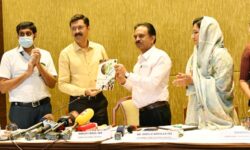NEW DELHI:
One of the biggest challenges that India’s smart cities program faces is designing a sustainable mobility ecosystem that empowers citizens to travel safely and in an eco-friendly manner. India’s cities today are home to millions of vehicles which, in addition to their profound contribution to greenhouse gas emissions, also cause problems of congestion. Inadequate roadway, parking, and transport infrastructure are ailing the Indian transport sector, which is one of the largest and most diverse in the world. In the EV & Battery Tech India 2018 Summit at the 4th Smart Cities India 2018 expo held recently at Pragati Maidan, a panel of distinguished experts agreed that the best way forward was through a concerted effort to encourage electric vehicles and their use in our cities today.
The conferences comprised many sessions, workshops, and conferences taking place at the 4th Smart Cities India 2018 expo, and featured industry leaders from the electric vehicles manufacturing sector, policy advisors, government representatives, etc. The distinguished panels brought their expertise and experience into play in an illuminating discussion about the benefits, challenges, and opportunities facing the electric vehicle industry in India.
Manoj Kumar, Chairman and MD, Delhi Transport Corporation, speaking on the need for sustainable public transport, said, “There is a significant opportunity for India to explore partial privatisation to make the bus network in the country for a healthy balance between traditional fuel, as well as renewable energy-driven. With the population expected to double in the next 20 years, the demand for buses is expected to rise by 4 times, while CO2 emission is expected to rise by 8 times. This is why shared mobility is the need of the hour to deliver the highest level of seamless and convenient transport options to the people.”
Speaking at the event, Chetan Maini, Managing Director, Sun Mobility, India, said, “Currently, the biggest challenge to electric vehicles becoming a mass consumption product is the heavy cost of units leaving the factory, and the concerns around charging in terms of infrastructure, convenience, and time taken. While swappable batteries can help with some of these concerns, many products are coming with a fixed battery which shows a lack of thorough consideration in product design. However, with the cost of renewable energy going lower than gas for the first time, many companies are expected to enter into producing renewable energy in the next decade. They should not miss out on the opportunity with electric vehicles, as it would very likely supply the basic transportation needs of India’s future smart cities.”
Chetan Maini further added, “The reduction of the cost of renewable energy is a huge factor as it could permit sustained use of electric vehicles without reliance upon subsidies. The important thing for policy-makers to remember is that in India, a majority of people use public transport daily. In Bangalore, for instance, 47% of people travel by buses and 45% by two and three-wheeled vehicles. With over 9 out of 10 Indians travelling through these low-cost methods, electric vehicles renewable energy-driven solutions targeting them should be cost-effective and sustainable. We have to get our vision right, so that we can start laying down the plans to build the infrastructure to support the transport industry we will need in the future.”
Discussing the commercial avenue taken towards building one of India’s biggest electric vehicles businesses, Mahesh Babu, CEO, Mahindra Electric Mobility Limited, said, “We know what the journey up until this point has been, and going forward we are all aware of the need to increase the production of ‘Make in India’ electric vehicles. There is much that we are currently lacking, but I am optimistic that as Mahindra came up with technology to create value for the customer to solve a problem, it is inevitable that this technology would be put to good use. The challenge is we have to give customers affordable, valuable products, at global quality standards.”
Panellists at the summit agreed that technological integration must be coupled with infrastructure planning, while a common vision with respect to green and sustainable transport can truly enhance urban living for citizen across the country. Although challenging initially, adopting green technology and renewable energy sources for transportation will be critical to not only to building smart urban infrastructure in the country, but also combatting the damaging impact of pollution and climate change. Further, the experts and industry leaders reiterated that the government’s goal of achieving a capacity of 100 gigawatts for renewable energy production, along with the right policies at both state and national levels can take the country forward towards an age of holistic, sustainable, and inclusive growth in the future.




